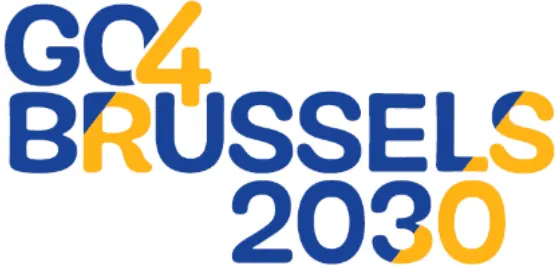Achieving the digital transition
Within its strategic multi-year plan, Go4Brussels 2030, the Brussels Regional Government is committed to realising the digital transition of the Brussels economy (Objective 1.8_Region).
The Brussels-Capital Government aims to implement a transversal and inclusive digitalisation policy. The impact of digitisation on our economy is evident. Therefore, considering the numerous challenges involved, a transversal digital policy is needed. Digitisation aims to create functions through public authorities that facilitate the lives of businesses and citizens, aligning with the policy objectives set out in the government agreement. The government will also ensure that the digital transition is inclusive so that all Brussels residents, regardless of their background, can access the opportunities that digitisation provides.
However, as new technologies are inherently evolving, specific knowledge and competence are required to master them. It is essential to provide tailored training at all levels for Brussels residents, from basic computer literacy and online use of government services to professional training in digital skills that align with the job market's needs.
Who is leading the effort?
Objective with consensus priority
- Initiating Minister: Minister of Labor and Vocational Training, Digital Transition, and Administrative Simplification; State Secretary for Economic Transition and Scientific Research
- Associated Ministers: Minister of Climate Transition, Environment, Energy, and Participative Democracy
- Partners: CIBG, GOB Easy Brussels, GOB ITCO, Brupartners/Sectoral Facilitation Service, BRUXEO (for e-health), Hub.brussels, Actiris, Bruxelles Formation, Innoviris
- Steering Committee: CIBG, Easy Brussels (GOB), ITCO (GOB), Brupartners/Sectoral Facilitation Service, Hub.brussels, Actiris, Bruxelles Formation, Innoviris
1. Accelerating the Digital Economy
- Evaluation of the Nexttech plan and development of the new Digital Economy Plan. The evaluation of the Nexttech plan will assess whether the digital tool acts as a catalyst in service of the General Policy Statement's environmental, economic, and social ambitions. In line with this, developing the new plan should consider climate goals and integrate with other economic plans and the digital transition.
- Launch of the ICT training and employment centre through a prior sectoral framework agreement.
- Support for the digitalisation of businesses. Support for SMEs and micro-enterprises in their digital development (online presence, training in digital tools like CRM or training for access to online government procurement software). Opening up the ICT cluster to professions related to coding and programming, especially in the field of gaming.
- Support for the synergy between the Digital Transition Plan and technologies with a cross-sector impact such as artificial intelligence and big data, which should provide impetus for climate, economic, and social transition objectives and the shift towards greater urban resilience (e.g., improved mobility management, transport mode efficiency, predictive pollution peaks, energy efficiency in buildings, etc.).
- Common competitiveness cluster. To strengthen ties between regions and increase support for this sector and the booming creative and cultural industries sector, the Region will first create a common competitiveness cluster with joint regional funding. Interested universities, colleges, media companies, and startups active in the digital and creative economy will participate.
Leading authorities:
- Minister of Climate Transition, Environment, Energy and Participative Democracy
- State Secretary for Economic Transition and Scientific Research
2. Promoting the e-health sector
Raise awareness and stimulate companies for opportunities in the rapidly evolving health sector due to the emergence of new technologies (e-health), in collaboration with other Belgian entities, and thus participate in the e-health ecosystem developed and guided by the ehealth.brussels platform. This aims to address social and healthcare needs and the need for urban resilience (cf. research on the impact of digitisation on welfare services in Wallonia can serve as a starting point for a Brussels study). Support innovation in health tech, particularly through open data and artificial intelligence policy.
Leading authorities:
- Minister of Labor and Vocational Training, Digital Transition, and Administrative Simplification
- State Secretary for Economic Transition and Scientific Research
3. Ambitious regional policy for open data management
Organise the dissemination and use of open data from public institutions and private companies to enable numerous new applications for high-added-value services and support innovation in businesses and government services.
Support innovative companies that use public open data to create a positive societal impact.
Leading authority:
- Minister of Labor and Vocational Training, Digital Transition, and Administrative Simplification
4. Streamlining interaction between administrations and businesses
Use digital transition to streamline and expedite interactions between administrations and businesses to reduce administrative burdens, including applying the "only once" principle.
Promote the market of technology companies offering services that public authorities can use to accelerate their modernisation (GOVTECH).
Leading authority:
- Minister of Labor and Vocational Training, Digital Transition, and Administrative Simplification
5. Guiding all citizens through the digital transition to meet labor market expectations
The last pillar is to prepare our businesses for the major technological trends they face, and this preparation must be inclusive. The goal is to close the digital divide in our region and anticipate its future forms. Particular attention will be paid to the female audience, which is more affected by this divide.
It is essential to provide tailored training at all levels for Brussels residents, from basic computer literacy and online use of government services to professional training in digital skills (especially in artificial intelligence and open data) that align with the job market demands.
Leading authority:
- Minister of Labor and Vocational Training, Digital Transition, and Administrative Simplification
